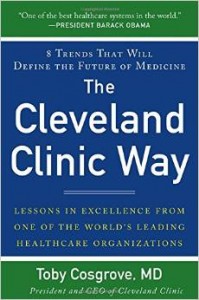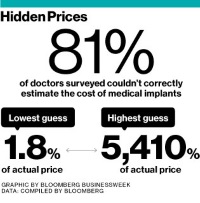Category: “Training”
- Meaningful Use – carrots are over, time for the stick
- 6 in 10 Buyers Looking to Replace Practice Management Software
- An Entrepreneur’s Prescription For Fixing Healthcare: Start Innovating!
Forbes interviews Jonathan Bush is CEO and coFounder of athenahealth, Inc. about his book entitled Where does it Hurt?: An Entrepreneur’s Guide to Fixing Health Care. He shares his fundamental belief in the need for systems-changing innovations in health care. Ashoka approached Jonathan to draw him out on his vision and driving principles.
- Hospitals’ Race to Employ Physicians
- Cleveland Clinic’s CEO Toby Cosgrove writes a book – if you sell there you must read this
- Selling point for EHR – patients want access despite risks
- Helping hospitals prevent HIPAA violations can be very profitable
Kaiser has had its fourth HIPAA breach. "To date, more than 30.6 million individuals have had their PHI compromised in a large HIPAA privacy or security breach -- breaches involving more than 500 people -- according to data from the Department of Health and Human Services. HIPAA-covered entities and, now, business associates, have handed over some $18.6 million to settle alleged federal HIPAA violations, with $3.7 million of that just from last year. And this isn't counting the state and private legal settlements."
- The hot MedTech technology to be selling in the next few years
- Introduction to U.S. Health Policy: The Organization, Financing, and Delivery of Health Care in America
Barr introduces readers to broad cultural issues surrounding health care policy, such as access, affordability, and quality. He discusses specific elements of U.S. health care, including insurance, especially Medicare and Medicaid, the shift to for-profit managed care, the pharmaceutical industry, issues of long-term care, the plight of the uninsured, medical errors, and nursing shortages. The latest edition of this widely adopted text updates the description and discussion of key sectors of America’s health care system in light of the Affordable Care Act.
- Gifts to Physicians from Industry – AMA guidelines
- Without considering data security you won’t sell much into Hospitals
- To increase sales effectiveness manage more than the pipeline
Sales Effectiveness is a function of sales velocity, the speed with which you put sales through your business.
- The words CIOs don’t want to hear
- Video: How sales prevention can actually increase sales and business profits
- What’s a Sales Coach, and Why Do You Need One?
- 6 Concerns of Healthcare Supply Chain Executives
1. Regulatory compliance — 63 percent
2. Product security — 53 percent
3. Managing supply chain costs — 51 percent
4. Product damage or spoilage — 43 percent
5. Access to global markets or new customer bases — 37 percent
6. Changing distribution and market channels — 25 percent - Help Prospects See The Inconsistencies In Their Thinking To Break Status Quo
Changing someone’s mind “isn’t a question of pushing new information on people and trying to explain it in words. It’s more about helping people see the inconsistency in themselves and then all of a sudden the mental model will shift naturally and easily,”
- Effects of the Most Recent Reimbursement Cuts to Diagnostic Imaging
- Radiology Prepares for the ACA, Including a Potential Flood of Patients
In retrospect how wrong they were...
- Video: Stefan Larsson “What doctors can learn from each other”
Different hospitals produce different results on different procedures. Only, patients don’t know that data, making choosing a surgeon a high-stakes guessing game. Stefan Larsson looks at what happens when doctors measure and share their outcomes on hip replacement surgery, for example, to see which techniques are proving the most effective. Could health care get better — and cheaper — if doctors learn from each other in a continuous feedback loop?
- What Does It Take to Get Hired In The Medical Device Industry These Days?
- Where selling might be difficult: Top 10 States for Uncollectible Hospital Revenue
- Video: Atul Gawande “How do we heal medicine?”
Our medical systems are broken. Doctors are capable of extraordinary (and expensive) treatments, but they are losing their core focus: actually treating people. Doctor and writer Atul Gawande suggests we take a step back and look at new ways to do medicine — with fewer cowboys and more pit crews.
- Goldfish have a longer attention span than prospects – does your sales story interest prospects?
- Private practice Radiology might be a thing of the past
“Private practice radiology flourished in the era of fee-for-service medicine but it is less well poised for the transition to a more capitated form of health care reimbursement with bundled payments and decreased reimbursement,” the authors write.
- There’s gold in them there hills – IT Outsourcing will increase
- The brain is a lazy decision maker
- Harvard Business Review: The Dirty Secret of Effective Sales Coaching
Unfortunately, our data show that both managers’ coaching tendencies, and companies’ response, are misguided. In research involving thousands of reps, we found that coaching — even world-class coaching — has a marginal impact on either the weakest or the strongest performers in the sales organization.
- How Much Do Medical Devices Cost? Doctors Have No Idea
The survey of 503 orthopedists at institutions including Harvard, Stanford, and the Mayo Clinic considered doctors’ answers correct if they came within 20 percent of what their hospital paid suppliers. The worst guesses ranged from a small fraction of the actual price to more than 50 times what the hospital paid.
- RX for R&D: Repealing the Medical Device Tax






